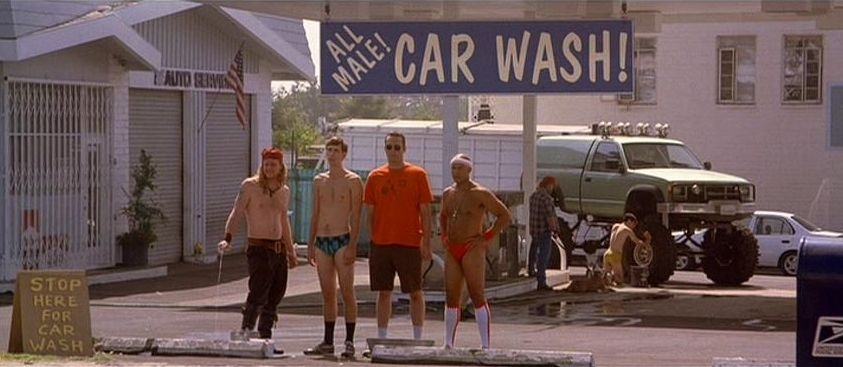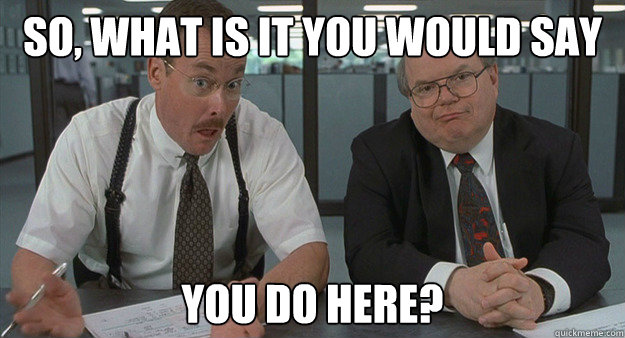Federal judges are supposed to be fair and neutral when it comes to interpreting the Constitution. But under what's known as "rational basis review," if judges think your rights aren't important (or "fundamental"), then laws are almost always presumed to be constitutional.
That means judges don't need facts to uphold laws that violate many of your rights. So under the rational basis test, terrible laws can only be struck down if the person challenging it beats back every single justification for that law—including ones that are completely made-up!

As if that weren't bad enough, neither the words "rational basis review" nor this whole concept of fake judging appear anywhere in the Constitution.
In fact, the idea behind it dates back to a footnote from a Supreme Court case in the 1930s involving federal milk regulations.
Decades later, that tiny little footnote has spawned all sorts of insanity like…
1. Barely any laws are declared unconstitutional
Over one million laws were passed by Congress and all 50 state legislatures between 1954 and 2002. But the Supreme Court struck down only 555 of these laws. That's less than 0.054%.
To put it a different way, for every 5,000 state and federal laws passed, the Supreme Court will only strike down 3. Not 3,000 or 300. 3.

2. Regulations can be totally useless and still be constitutional

An Oklahoma law banned opticians from duplicating lenses or putting old lenses into new frames unless someone had a prescription from an eye doctor. It even banned opticians from fitting eyeglass frames to a person's face, because they weren't full-blown eye doctors!
Noting how blatantly anticompetitive it was and how utterly unsubstantiated were the government's assertions about protecting consumers, a lower court struck down the law.
Unfortunately, the U.S. Supreme Court had different ideas. In Williamson v. Lee Optical, the court conceded that opticians could "easily supply" new frames or new lenses as they routinely did (and still do) in other states without Oklahoma's ridiculous licensing requirement.
But under rational basis review, the Supreme Court actually made up hypothetical justifications to uphold the law, even though they were completely baseless. So in the end, the Supreme Court held it was totally fine for the government to "exact a needless, wasteful requirement".
3. The government doesn’t need to show a law is necessary or even helpful in any way

If you practice interior design without a license in Florida, you could face up to
one year in jail. In fact, the state's interior design board hired a private law firm to act as a kind of bounty hunter, tracking down those without government permission slips and pursuing hundreds of cases.
Fed up, three interior designers took Florida to federal court. Unfortunately, they lost. In Locke v. Shore, the 11th U.S. Circuit Court of Appeals ruled that "…the right to practice a particular profession is not a fundamental one." (Of course, those three interior designers would beg to differ.)
Since the courts don't consider the right to earn a living to be "fundamental," the 11th Circuit applied rational basis review to the case.
So the court held that requiring a college degree just to practice interior design was a perfectly valid exercise of government power—without a shred of evidence that allowing people without college degrees and government-issued interior design licenses present any threat to public health and safety.
Not only that, the 11th Circuit even ruled that Florida "had no burden to produce evidence of the [supposed] safety benefits" from interior design licensing.
Translation: "Hey, you're the government—we'll just take your word for it!
As if that weren't bad enough, Florida is one of only three states that licenses interior designers. Every single state that looked at the issue carefully has reached the same conclusion: the unlicensed practice of interior design is not a menace to society.
4. Cats marooned on an island count as “interstate commerce”


The USDA wanted to make the museum comply with a federal law governing "exhibitors" of animals that was meant to be applied to lab monkeys and circus elephants, but was stretched beyond recognition by the USDA to include house cats.
The USDA opened a two-year investigation, which even included undercover agents being sent to Key West to document on camera what no one disputed: The Hemingway cats slept outside under the stars. As the lawyer for the Hemingway house put it, "This is what your tax dollars are paying for. The agents are coming down here on vacation, going to bars and taking pictures of cats."
That's like the dream job of any BuzzFeed reader!
After a nine-year battle, the 11th U.S. Circuit Court of Appeals ruled that the federal government did indeed possess the constitutional authority under the interstate commerce clause to regulate the museum.
But that ruling was silly for many reasons, including two in particular. First, the cats were never in any real danger. The court itself acknowledged that "the museum has always kept, fed, and provided weekly veterinary care for the Hemingway cats".
In fact, the Department of Agriculture even sent PETA to investigate how the cats were doing: "What I found was a bunch of fat, happy and relaxed cats. God save the cats."
Help! Help! I'm being repressed!
Even crazier, despite the fact that none of these feisty felines has ever been bought, sold, or transported beyond the Hemingway House at 907 Whitehead Street on an island in Key West, Fla., the 11th Circuit still found that they "substantially affect interstate commerce" and are therefore subject to federal control.
As the court helpfully explained, "it is not the court's role to evaluate the wisdom of federal regulations." No kidding.
5. Federal judge thought government could license florists because dirt might be dangerous

Seymour Krelborn didn't have a florist license. Now look at him.
Louisiana is the only state in America that requires florists to get a license to work. Yes, florists. That state's silliness was challenged in court in Meadows v. Odom.
But thanks to rational basis review, a law can be constitutional, no matter how ridiculous and transparently insincere the government's justifications might be.
In making his decision, the trial court judge cited testimony from representatives of the state Horticulture Commission (aka "the flower police") about how people could supposedly be harmed by the menace of unlicensed floristry: exposed floral picks, broken wire, and "dirt" with "some type of infection."
And the guy giving that testimony just so happened to be in charge of cracking down on unlicensed florists for Louisiana. Go figure.
Even though those threats were about as realistic as The Happening, the judge still upheld that law.
6. Federal court says crony capitalism is OK since everybody does it

Many Americans, especially if they've had a junior high civics class, would agree it's wrong for businesses to use the government to eliminate competitors (also known as "economic protectionism"). Unfortunately, the Tenth Circuit U.S. Court of Appeals thinks that's just fine.
Kim Powers and Dennis Bridges were two entrepreneurs who wanted to sell high-quality caskets at a discount price. But in Oklahoma, only licensed funeral directors can sell caskets, even if a business doesn't actually perform any funerals or handle dead bodies. That license requires years of training and thousands of dollars in costs.
Yet less than 5% of the training required to get a funeral director license is actually related to selling caskets. That's a lot of dead weight.
Of course, the only people who really benefit from this scheme are the funeral directors. So Powers and Bridges sued the Sooner State.
In Powers v. Harris, the 10th Circuit Court of Appeals refused to overturn a state law even if there were "no empirical evidence" to support it. 
In the most jaw-dropping passage of its decision (a decision you really must read to believe), the Tenth Circuit held it's perfectly legitimate for the government to pick winners and losers in the marketplace by sandbagging some people with arbitrary regulations.
Those judges even compared crony capitalism to baseball. Seriously:
"…while baseball may be the national pastime of the citizenry, dishing out special economic benefits to certain in-state industries remains the favored pastime of state and local governments."
Since special interests have been getting away with this kind of thing for so long, it must be constitutional!
What's even crazier is that just two years earlier, the Sixth U.S. Circuit Court of Appeals struck down an almost identical law in Tennessee. And earlier this year, the Fifth Circuit struck down a very similar law in Louisiana. So WTF Tenth Circuit?
7. Car wash counts as entertainment

8. Your Home or Business Can Be Bulldozed and Given to Politically Connected Property Developers

New London, Conn., wanted to transform a working-class neighborhood into a posh urban enclave. Executives at the nearby Pfizer research facility really wanted the neighborhood transformed to meet their "requirements" for high-end housing and a four-star hotel, and the city was only too happy to oblige.
So the city invoked the power of eminent domain, even though the Constitutions says it can only be used for a "public use" like roads or schools. But no one asked the residents of New London, and when the bulldozers started rolling, they headed for court—in fact, all the way to the U.S. Supreme Court.
Even though this was a pretty blatant case of using eminent domain for private gain, five justices instead held that bulldozing the Fort Trumbull neighborhood and giving the land to a wealthy property developer had a conceivable "public purpose" since all those purely hypothetical new condos might increase tax revenue. (Of course, the Constitution specifically says "public use," not purpose.)
Kelo v. New London emboldened other cities to use eminent domain for redevelopment. In fact, one town in Texas condemned three properties just hours after the ruling came down.
Fortunately, there has been a huge backlash to the Kelo decision, with 44 states reforming their eminent domain laws. Unfortunately, some of the laws are plagued with loopholes, so abuse still happens.
And what happened to the Fort Trumbull neighborhood where Susette Kelo's little pink house once stood? It remains a weed-choked, bulldozed wasteland—all those high-end townhouses and ritzy office buildings were about as real as Manti Te'o's girlfriend.
9. Growing marijuana and giving it to someone in the same state counts as “interstate commerce”
Angel Raich suffers from seizures, severe chronic pain, and an inoperable brain tumor. Even worse, she's allergic to many medications. So after California legalized medical marijuana, her doctor recommended she use cannabis for her treatment.
But marijuana is still banned under federal law as a Schedule I drug. (For those of you keeping score at home, the DEA considers cocaine and meth to be Schedule II drugs.)
After DEA agents seized and destroyed six cannabis plants that friends had been growing for Raich, she sued. Her case ended up going all the way to the U.S. Supreme Court.
The marijuana in question was grown for Raich's own personal consumption, was never bought or sold, and never left California. But thanks to the rational-basis-style approach the Supreme Court has adopted in federalism cases, none of that matters!
In Gonzales v. Raich, the Court employed some extreme mental gymnastics. It held that when Congress makes it illegal for someone to give marijuana to a friend in the same state, that act can be regulated under Congress's authority "to regulate Commerce…among the several States."
Man, what were they smoking?
As Justice Clarence Thomas wrote in his dissent:
"If Congress can regulate this under the Commerce Clause, then it can regulate virtually anything–and the Federal Government is no longer one of limited and enumerated powers."

Or, as another dissenting judge put it in an actual interstate commerce case: "If we had some ham, we could fix some ham and eggs, if we had some eggs".
So instead of judges failing to, you know, judge.

Judges need to be engaged and not be afraid to strike down terrible, silly and terribly silly laws.
For more unbelievable facts about what's going on in America's federal courts, check out Institute for Justice senior attorney Clark Neily's new book, Terms of Engagement: How Our Courts Should Enforce the Constitution's Promise of Limited Government.


